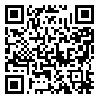Volume 4, Issue 1 (Continuously Updated 2021)
Func Disabil J 2021, 4(1): 0-0 |
Back to browse issues page
1- Department of Psychology and Education of Exceptional Children, Faculty of Literature, Humanities and Social Sciences, Science and Research Branch, Islamic Azad University, Tehran, Iran. , shilashabdini26@yahoo.com
2- Department of Psychology and Education of Exceptional Children, Faculty of Literature, Humanities and Social Sciences, Science and Research Branch, Islamic Azad University, Tehran, Iran.
2- Department of Psychology and Education of Exceptional Children, Faculty of Literature, Humanities and Social Sciences, Science and Research Branch, Islamic Azad University, Tehran, Iran.
Abstract: (851 Views)
Background and Objectives: The present study was conducted to determine the effect of a family-based sensory diet program on children with attention-deficit/hyperactivity disorder (ADHD). In this program, parents were directed to use activities stimulating the vestibular, deep, tactile, visual, and auditory senses to maintain the children’s focus and organized consciousness.
Methods: This research was a quasi-experimental study with a Pretest-Posttest design with an experimental group. Wechsler Intelligence Scale for Children (WISC-IV) and Conners’ parent rating scale were used to measure the study variables. The study’s statistical population included all children with ADHD aged 6-12 years referred to Hasti, Bahar, and Masir-e Sabz health clinics in 2020. Of them, 30 participants were selected through a convenience sampling method.
Results: Based on the analysis of covariance (ANCOVA), the obtained F values of attention deficit and hyperactivity were significant at a level less than 0.05. So the test hypothesis is accepted, and family-based sensory diet sessions effectively reduce ADHD symptoms in these children.
Conclusion: According to the findings and the degree of effectiveness, implementing the sensory diet program by the child’s family can effectively reduce ADHD symptoms.
Methods: This research was a quasi-experimental study with a Pretest-Posttest design with an experimental group. Wechsler Intelligence Scale for Children (WISC-IV) and Conners’ parent rating scale were used to measure the study variables. The study’s statistical population included all children with ADHD aged 6-12 years referred to Hasti, Bahar, and Masir-e Sabz health clinics in 2020. Of them, 30 participants were selected through a convenience sampling method.
Results: Based on the analysis of covariance (ANCOVA), the obtained F values of attention deficit and hyperactivity were significant at a level less than 0.05. So the test hypothesis is accepted, and family-based sensory diet sessions effectively reduce ADHD symptoms in these children.
Conclusion: According to the findings and the degree of effectiveness, implementing the sensory diet program by the child’s family can effectively reduce ADHD symptoms.
Article number: 48
Type of Study: Research |
Subject:
Occupational Therapy
Received: 2021/11/12 | Accepted: 2021/12/3 | Published: 2021/12/28
Received: 2021/11/12 | Accepted: 2021/12/3 | Published: 2021/12/28
| Rights and permissions | |
 |
This work is licensed under a Creative Commons Attribution-NonCommercial 4.0 International License. |




